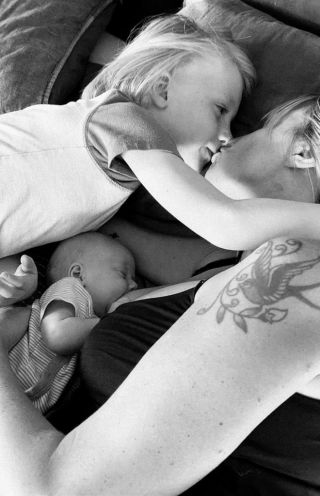Loneliness
The Mental Load in Early Motherhood
Personal Perspective: The weight of invisible labor affects moms in many ways.
Posted February 9, 2023 Reviewed by Michelle Quirk
Key points
- Postpartum mood disorders affect as many as 75 to 80 percent of mothers.
- Mental load, or emotional load and invisible labor, weighs on mothers in unexpected ways, including a sense of loss and loneliness.
- Finding a way to name and communicate about mental load can help mothers process loss, isolation, and or loneliness.
At this moment, my 8-month-old daughter is comfortably entertained in her play gym. She’s giggling and cooing as she jiggles her crinkle-paper toy. I’m sitting crossed-legged beside her, laptop balanced on my knees. If her mood shifts and she needs my care, I’m here. In addition to being on call, I’m attempting to write a blog post that explores the weight of my mental load. Life can be so meta.
My life, like that of most parents, is a bit wild. I rise early to the sound of my daughter calling for me. Even before I’ve scooped her up from her crib, I’m running logistics in my head. I know the next 60 or so minutes will be more like an all-out scramble to get everyone’s needs met than a peaceful morning routine. I calculate when my daughter will need her first nap, how I’ll fit a shower in, what client emails I need to return, and whether my son has any events at school. As the countdown to taking him to school begins—and I nurse my daughter—I think, I may have to pump on the way home from school drop-off. Are my pump parts clean? Where's my freezer bag? I figure all of this out quickly so I can get on with the day.

Being eight months postpartum, with an older child to care for and a psychotherapy private practice to run, I find myself thinking about the weight of my mental load. How is it affecting my mental health and overall well-being? What about my marriage? My relationships with my kids? While much has been written about mental load (also called emotional load and invisible labor, among other terms), I’m noticing its weight affecting me in two ways I haven’t heard spoken about.
A Sense of Loss
The first is a sense of loss. Specifically, I feel this loss in my creative life. I no longer have uninterrupted time for my creativity to flourish. For example, I may get an idea for a post I want to write, then jot down some notes in my iPhone, but that’s it. Blog post ideas about “Why We Minimize Our Pain” and “The Good-Enough Partner” are sitting in my phone app as titles without text. The mental load of my ever-present invisible list of who needs what and when to keep the choreography of our family moving stifles the creativity for those posts or anything else I might want to write.
I had a similar experience after my son was born. I grieved the loss of the time and space to write, collage, or paint—creative expressions I enjoyed regularly before motherhood. That part of me was put on the shelf for two years after his birth. I started creating again slowly as mothering became more familiar and he grew more independent. This time around, I’m familiar with being a mother, so that’s not keeping me from visiting that shelf; rather, it’s that early motherhood is all-consuming. I’m grateful to be the person who gets to meet my daughter’s sometimes relentless needs, and I feel a loss stemming from that as well.
I know I’ll get that space to create back, but I don’t know exactly when. My mental load will shift when she stops nursing, and it’ll shift more as she grows. Even so, there will always be a space in my mind for my kids, and that space will inevitably have an impact on everything else in my life. Wondering how my kids are and trying to conceptualize their needs and wants are mental labor. I love doing that labor, and, at the same time, there is a personal loss for me.
Loneliness
The second impact I don’t hear much about is loneliness. There’s no one else to truly appreciate all the unpaid, unseen, and crucial mental labor of motherhood. I don’t want to talk about my calculations related to feedings and pumpings because, frankly, it’s boring to me. Which makes it an isolating experience. I love breastfeeding, and to do it, I have to work out all the logistics. If I don’t think I’ll be available for my daughter when she wants to nurse, I have to pump. My pumps need to be charged, the parts need to be cleaned, etc. I have asked for my husband’s help with this, and he is super helpful. I feel seen when he washes and puts my pump parts together, streamlining the task, but it’s still just me doing all the mental gymnastics in my head day in and day out. It’s the lonely, unpaid, unappreciated part of motherhood. And that in and of itself weighs on me.
Postpartum mood disorders are real experiences, affecting as many as 75 to 80 percent of new mothers, and are important to diagnose and treat. However, I wonder if there are other ways to talk about and quantify the adjustment to motherhood and the pain endured throughout that adjustment. What if we could talk more openly and honestly about our losses? Our loss of identity? Of freedom? Of personal possibilities? Of creativity? Of time with friends? What about loneliness in motherhood? My sense is that if we could find ways to name and communicate about the mental load of motherhood, we would be one step closer to reducing the immense weight of that load.
You may only have been reading for a few moments, but I’ve had to start and stop writing countless times to get here. To pick up my son. To play with my daughter. For bath time and dinner time. I’m now at the kitchen table, pumping while writing as my daughter naps and my son is at school. Why could I finish this post, when the others are still only titles on my phone? It’s because I’m naming my mental load and I’m communicating that to you. In this way, it is no longer invisible. I’m no longer invisible.
Finding a way to name and communicate about your mental load can help you process your loss, isolation, and/or loneliness. You can lighten the load by being a witness in this way. You can also ask your partner, a trusted friend(s), or a therapist to be your witness. Naming and communicating about the weight you are bearing won’t make it vanish, but you will gain the tenderness necessary to live with it.
References
Iwanowicz-Palus, G., Marcewicz, A. & Bień, A. (2021). Analysis of determinants of postpartum emotional disorders. BMC Pregnancy Childbirth 21, 517. https://doi.org/10.1186/s12884-021-03983-3




